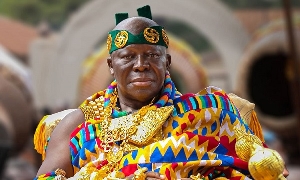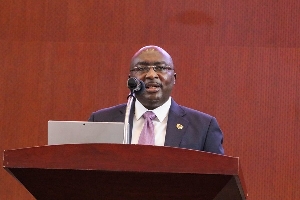Opinions of Monday, 25 September 2023
Columnist: Clement D. Timpo
A diasporian opinion and the need for discussions on an irrigation system leading to agricultural revolution in Ghana
Sixty years ago, Ghana was liberated from British colonial rule or what may be referred to by political pundits as liberated from the clutches of imperialist colonialism.
As we celebrate this year’s Independence Day Anniversary on March 6, 2017, we need to take stock of the current situation or have some level of reflection on our achievements since March 6, 1957; we need to count our achievements not only in terms of the industrial sector but also in the very important agricultural sector.
There is a need to search our souls and dig deep down into our spiritual archives to find out why Ghana, an agrarian society with a topography of greenery and abundant forestation, should there be need to import locally grown food from its northern neighbors, where the land and agricultural sector conditions are not very ideal relative to that of Ghana.
The idea of Ghana importing local food from her northern neighbors, if true, is very repulsive, and reprehensible; it makes one’s heart shudder with grief and therefore ask the question, “Oh mother Ghana, what the heck is going on”?
For the past few years, on Ghana’s Independence Day Celebration, the practice has been to write an article tracing and reminding us of our history -This article therefore is a continuation of previous years’ practices - to trace the history of the people of West Africa before the arrival and the eventual colonization by the white-man.
How the colonized people fought for their independence, and the life thereafter leading into the 21st century. This discussion focuses on how a people who initially engaged in a productive and self-reliant subsistence agricultural lifestyle would abandon that culture in favor of the white man’s culture, even though it’s understandable that agriculture is also part and parcel of the white man’s culture.
Furthermore, the intent of the article is to bring about an articulate discussion on the need to reverse this declining trend in the agricultural sector.
The people of West Africa should count themselves very lucky and should forever be thankful to the mosquitoes for rattling and unsettling the white man upon venturing uninvited into West Africa.
In the South, Southwest, and Southeastern regions of Africa, where the vegetation and climate conditions were ideal and like that of Europe the visiting Europeans dominated the people and established permanent settlements.
We could not drive the white man out of West Africa through wars; fortunately, the mosquitoes did the fighting for us. Despite the mosquitoes winning the war on our behalf, the white man however managed and found some other means of colonizing and governing us from the trading posts they built along the coastlines or from home in Europe.
For some of us in the Diaspora, we have become the ridicule of some Western politicians who constantly barrage us with insults about our immigrant status and treat us as if we are homeless citizens or people with no country, no matter how long we have lived in the Western world.
We are constantly threatened with deportation because to them we are leaches on their economies. The only programs one sees featured on Western TV on Africa are on senseless inter-tribal wars and starvation. To an average citizen in the Western world, especially America, Africa understandably is featured as a tiny little village, where everyone should know each other.
Upon having an innocuous conversation with a Westerner, you have met for the very first time, and once an accent is detected, the very first question is “Do I detect an accent? I have an African on my job or neighborhood, his or her name is …., do you know him/her”. You get bewildered by such stupid lines of conversation but have no control over directing it on issues of intelligence. This is what some of us in the Diaspora go through constantly.
We have no one to blame but ourselves; we would forever wish we had stayed at home and helped with the post-independence reconstruction. All we can offer now would be some outside-the-box contributions of ideas with the hope that they will be accepted.
Black Africa’s problem as one contemplates it would be one of the abandonment of God-given cultures in favor of Western cultures. The people of the Far East have also borrowed some constructive knowledge from the Western world and used such knowledge in the improvement of their reconstructions while at the same time maintaining their core cultures.
On the other hand, Black Africans from East to West to the South have abandoned their own God-given cultures and assimilated or replaced them with those of the West.
Midwest Africa Before the Arrival of the White Man
The history of the inhabitants of this West African area; the area we now call Ghana and before the white man first set foot on their soil consisted of very simple agricultural lives —we had those who were farmers, and dwelled in the mainland, and the fishermen, who lived on the coastal areas.
Their daily routines were very similar, consisting of waking up early at the crack of dawn, or at the crow of the cock, and would trek about four to five miles to their farms.
They would work all day until sunset, tilling the land and tending to their crops. The women and children would prepare the land for the sowing of the crops, while the men took care of the heavier chores-- hunting, clearing, and burning the land to get it ready to be tilled.
In the evening, before returning to their villages, the women would harvest a few crops – the women would carry the harvested crops and the children the fire-woods.
The head of the households, the men would walk the rear, with their guns and machetes strung unto their backs or carrying their pride of the day, a catch from their traps. The fishermen on the other hand would go to the sea fishing on days those local taboos allowed fishing, also at the crack of dawn.
They would haul their fishing nets into their canoes and would go fishing—staying on the ocean for about two to three days, depending on the season. Upon their return, the women and children would meet them at the beach. They would help haul in the catch and would also help with the distribution to other women, who would prepare them for the lean season. Most of the catch would be smoked or dried for preservation.
Life in the farming communities was so mundane; upon their return from the farms, the women would immediately set out to the kitchen to prepare the evening meal. The children would play in the yard with anxious anticipation for the call that the food was ready.
The men however, after washing, would tend to their passion—the noble and the elders of the community would trot to the chief’s courtyard to adjudicate local disputes under the superintendence of the local chief. Others would adjourn under a popular tree, playing games carved out of tree trunks and drinking local alcoholic beverages. After dinner, the young ones would test their masculinity and feminine prowess by playing drums and dancing under the moonlight.
Some days of the week were reserved for other chores—the fishing community along the coastal areas would take these days to mend their fishing nets and boats to get them ready for the sea; the craft-men and women would tend to their crafts—cloth weaving, pottery and others.
In the mainland, the cloth weavers would spurn their yarns, the blacksmiths would build guns, machetes, and other tools, and the goldsmiths would turn gold, which was in abundance into ornaments, and regalia for kings, queen-mothers, and women. Some of the women would make pottery; the woodcraft men would make African artifacts, stools, and others. The palm-wine tapers would tap local wines “the palm-wine” and distill local alcoholic beverages, the “Apeteshie”.
So was life, so peaceful and serene. This area in West Africa was occupied by various tribal groups. Among these were the dominant Ashanti, whose empire occupied the central forest areas, stretching from the Denkyira kingdom, all the way to the edge of the Savannah, and the Mole-Dagbon tribal areas in the north.
Besides the Ashanti, some of the other major tribal groups were the Denkyira and the Akyems, occupying the south-central and the central-eastern areas immediately north of the coastline.
The Fantes occupy the central and western coastline, the Ga-Adangbe, occupy the southeastern coastal areas up to the Volta River, and The Ewe tribe, also occupy the eastern coastal areas from the eastern stretches of the Volta River up to the Mole-Dagbon boundary in the north.
The Brongs, occupied areas north of the Ashanti kingdom. The Akwamus, reside in the central river Volta basin. The Akwapims, occupy the central mountainous regions. The Dagatis, the Frafras, and the Grunshes all occupy the northwestern, and the upper northeastern areas. Residing within the major tribal groups were numerous smaller tribes with their own unique identities, languages, or dialects.
The Ashanti empire dominated most of the area north of the coastal areas deep into the forest areas, all the way to the savanna boundary. The tribes had their own forms of diplomacy. Diplomatic missions were sent out to other allied tribes inviting them to durbars and festivals.
Occasionally, there would be an outbreak of wars between the tribes because of one tribe would break the code of diplomacy; because a smaller kingdom had refused to pay homage to a mightier kingdom—the men would go to war leaving the women to cater for the young and the incapacitated elderly folks. Even those captured at war were assimilated into local cultures.
The land would be provided for them to settle. The vanquished would adopt the cultures of the conqueror. Before the first Europeans set foot on the West Coast of Africa in the 13th century, there was active trading between our forefathers and our northern Arabs neighbors in guns, gunpowder, gold dust and salt.
The Arrival of the Whiteman to Midwest Africa and the Eventual Colonization of Midwest Africa
Such was life, so mundane, so peaceful, until one day in the 13th century, over the horizon, a mile out into the sea, appeared some ships—they were docked, because they appeared stationary. Then in smaller boats, the occupants, some dressed in steel plaited armors, most in ordinary clothes came ashore.
Our forefathers’ predilection for, or purism to hospitality, eventually spelled their doom. They received the visitors with open arms—they escorted them to the chief’s palace, where after the usual customary African greetings, with water, food, and the local wine, the chief linguist would on behalf of the chief ask the “Amanie”, meaning our home is peaceful, what is your mission?
The visitors would respond usually in sign language indicating that they “came in peace”, that, they were on a sea voyage, passing through, that they had run out of water and supplies, and that they would be obliged if these could be made available to them. Food and drinks would be made available to them, and gifts would be exchanged.
Libation would be poured, asking the guidance of the almighty and the departed ancestors to lead them (the visitors) peacefully on their journey back home. They would depart, only to return a year or two later with the same story.
In their other quests, they would come with the missionaries, the Bible in their hands, preaching peace, and the words of God, per the Western civilization’s way of understanding the deity; thus, leading the way to the slave trade and the colonialism of West Africa.
Quoting former President Jomo Kenyatta of Kenya and of blessed memory “When the missionaries arrived, the Africans had the land, and the missionaries had the Bible. They taught us how to pray with our eyes closed. When we opened them, they had the land, and we had the Bible”.
As a start-off to the Whites’ trickery, which paved the way to the slave trade, the visitors would persuade a few Africans to go away with them, and to return with these Africans speaking the Whites’ language; having the ability to read the Whites book and dressed beautifully like the White-man.
This ultimately became the envy of all, with most ignoring the inherent dangers embedded in traveling to an unknown destination and making every effort to go away with the White-man. Eventually, those who left voluntarily never came back – one can only guess what happened to them. Later, under the canopy of trade, they began trading in slaves.
Some Africans were bought, and others were captured as prisoners of war between the Europeans and the local tribe-men, while others resulted from the inter-tribal wars among the locals, leading to the prisoners of war being forcefully taken away in masses, and in chains.
History has it that the Portuguese were the first Europeans to venture onto the Guinea coast of West Africa- they came in search of gold, which they found in abundance adorning the powerful Ashanti kings.
They soon began the construction of several forts along what came to be known as the Gold Coast, a name given by the British because of the abundance of the mineral called “Gold”, which was found in unbelievable quantities. Their plundered gold was shipped back to Europe as ingots. The Portuguese initiated the slave trade and were joined later by other Europeans.
Additionally, the Portuguese fortunes attracted other Europeans – the Dutch, British, and Danes. For the next 250 years, all four nations competed fiercely to control the trade, building forts or capturing those of rivals.
From the time the Portuguese discovered gold in 1471 to independence in 1957, the monarch of several European kingdoms, notably Denmark, England, Holland, Prussia and Sweden, sent hordes of explorers and merchants to the country for its abundant wealth, both natural and human.
They battled for supremacy and control over land and built forts and castles which also served as trading posts. Vestiges of the extent of European colonial presence and concentration are evidenced by the fact that 29 of the 32 European colonial forts and castles, which dotted the coast of West Africa, are in Ghana.
In 1821, the British took over the forts to use as customs posts, after the demise of slavery by signing treaties with many local chiefs, especially those in the coastal areas. These arrangements handsomely profited many of the chiefs --the wealth and influence of the chiefs made the British increasingly uneasy.
From 1826 to 1900, the British fought a series of campaigns against the Ashanti, whose kingdom was located inland. Then in 1873, when the Ashanti (the only powerful local empire the British could not conquer) refused to give up Kumasi (the capital of the Ashanti empire) the British besieged the city and declared the Gold Coast a crown colony.
Ashanti resistance continued until 1900 when the Ashantis attacked the British fort in Kumasi. The fierce battle that ensued almost destroyed Kumasi. In the end, the Ashantis having lost the battle to the British paved the way for the total British domination and colonialism of the Gold Coast.
The Fight for the Liberation of the Gold Coast
In the late 1920s, under the leadership of several political power brokers, among whom were Dr. JIB Danquah, Dr. K A Busia, Obetsebi Lamptey, Dr. Kwame Nkrumah, K.A Gbedemah, and a cadre of others who were dedicated to regaining African independence, freedom was finally achieved on March 6, 1957, the United Kingdom relinquished its control over the Colony of the Gold Coast.
The colonial name the Gold Coast was changed to Ghana, a name adopted from the old Ghana Empire, the supposed place of origin of our ancestors. Ghana was still treated as part of the British Empire, a member of the British Commonwealth of nations. Then, on July 1, 1960, Ghana became a full Republic, severing its final colonial linkage with its colonial masters, Great Britain.
Post Independent Ghana (Gold Coast) and its Industrial Advancements
From March 6, 1957, to 1992, Ghana went through many rough political and social changes. There was the need to catch up with the developed world and to stop the over-dependence on the developed world for the supply of finished goods.
Ghanaians under the leadership of Dr. Kwame Nkrumah wanted to eliminate the code name “Heavers of raw goods” to “Producers of finished goods”. A whole new industrial city—Tema was built, sufficient with a modern port and manufacturing plants. A hydroelectric dam was built at Akosombo to feed the industries with the much-needed energy.
Ghana dug deep into the earth in the search for the “black gold” –oil but to no avail. Ghanaians were trying hard to play catchups with the Industrial world. Obviously, those moves were too fast; the bold economic ventures led to the depletion of the much-cherished stockpile of foreign reserves left by the legacy colonial masters.
These bold economic moves, even though in the right direction, nevertheless, led to problems-- there were shortages of goods and supplies in the economic system, and there was total economic destabilization.
Ghanaians abandoned their own cultural and ancestral practices of relying on locally produced goods. Instead, they copied the European cultures and developments. Because of the economic destabilization and shortages in the economic system, there were several military coups that toppled democratically elected governments between 1966 and 1992, all with savior-faire to Ghanaians that such attempts were aimed at bringing about democracy, economic, demographic, and political stabilization.
In 1992, after 11 years of military rule, the Provisional National Defense Council (PNDC), handed over the administration of the country to an elected government with constitutional rule and a multi-party parliamentary system.
This has developed and revealed broad support by political parties for continuing economic reforms, placing greater emphasis on commitment to private sector development.
To this present day, Ghana is recapturing its leadership role in the African world, and its candor for providing economic emancipation for its people by engaging in prudent economic developments is in the right direction.
If this trend continues, Ghana should in the very near future assume, and play its role by adapting the leadership benchmark of its for-bearers as one of the leaders, and bearers of the flame of emancipation that will lead to the total political, economic, and demographic salvation, emancipation, and the decolonization of the entire African and people of African descent.
Influence of Foreign Culture on Africa:
Part of the problem as one sees it is that Ghanaians and for that matter Black Africans have totally abandoned the cultural and economic development traits of their ancestors.
They did not tow the ways of their forefathers; they did not build on what was bequeathed to them by their ancestors. Local African herbal medicines which were derived from some local herbs and used to cure certain cancerous diseases were abandoned in favor of the foreign equivalent.
Eventually, the older generations with such knowledge died off without passing on this medicinal herbal knowledge and practices to the disinterested younger generations, who because of the Western education believed only in the value of Western medicine. What a loss to Black Africa!
How else could one explain the celebration of “Valentine's Day” etc. in Black Africa instead of our traditional cultural festivals? In the Western world, these celebrations were instituted as instruments of economic leverage for stimulating and inducing economic growth.
The Western world encouraged institutions like Valentine's Day, Mother’s Day, Father’s Day etc. in Africa to supposedly encourage African economic growth sustenance. On these days manufactured goods sales from the western capitalist economies were incorrectly encouraged to revamp the local African economies.
Contrarily, this was the other way around, because the local African stockpile of foreign reserves was used to pay for such imports to the detriment of the African economies
Canals, Irrigation and the Need for Agricultural Development and Reforms in Ghana:
Canals and Irrigation
Canals are open waterways, usually in the form of field ditches to carry water from one place to another, especially to supply water through irrigation methods to plants at regular intervals.
Irrigation is the watering of land to make it ready for agriculture or a method of controlling the amount of water to supply to plants at regular intervals for agriculture. It is used to assist in the growing of agricultural crops, maintenance of landscapes, and re-vegetation of disturbed soils in dry areas and during periods of inadequate rainfall.
Additionally, irrigation is also used to protect plants against frost, suppress weed growth in grain fields, and prevent soil consolidation. Irrigation helps to increase agricultural production, and therefore cannot be overlooked if the intention is to increase agricultural production.
History has it that Irrigation has been a central feature of agriculture for over 5,000 years and is the product of many cultures. It is known historically that irrigation was the basis for economies and societies across the globe, from Asia to the Southwestern United States.
The oldest known canals were irrigation canals built in Mesopotamia circa 4000 BC, what is now Iraq. The digging of canals for irrigation has been an essential part of the civilization of Mesopotamia, controlling the water of the Euphrates and the Tigris.
The Chinese, the greatest early builders of canals, undertook the construction of several major canals from the 3rd century BC onward. These waterways combined the function of irrigation and transportation. Ancient Egyptians used the flooding of the Nile River to inundate land plots which had been surrounded by dykes.
The flood water was held until the fertile sediments had settled before the surplus was returned to the watercourse. There is evidence of the ancient Egyptian pharaoh in about 1800 BC using the natural lake of the Fayum Oasis as a reservoir to store a surplus of water for use during the dry season from the lake that swelled annually from flooding of the Nile River.
Also, history has it that Ancient Nubians developed a form of irrigation by using a waterwheel-like device called “Sakai”. The system of irrigation is largely dependent upon the flood waters that would flow through the Nile River and other rivers in what is now the Sudan.
In sub-Saharan Africa, irrigation reached the Niger River region cultures and civilizations by the first or second millennium BC and was based on wet season flooding and water harvesting.
There is a direct correlation between economic growth and agricultural production in nation-building. Great nations from Europe, and Asia to the new lands of America became great first by tackling their agricultural sector before the industrial sector.
Great nations started off first by producing enough to feed their population before exporting the surplus to earn the essential foreign exchange needed for the industrial sector development. Industrialization has its base in agriculture before any other form of industrialization.
America has its roots in nation-building by first developing the agricultural sector before branching off into the Industrial Revolution with its immigrant citizens bringing the knowledge of canal building, irrigation, and other forms of agricultural methods from different parts of Europe to America.
They had to fight through a period of primitive agricultural experiences; making corrective measures as they went along before becoming what they are today. No nation can have industrial-building capabilities on the empty stomachs of its citizenry. All nations should have a sense of “operation feed yourself” first before any other form of industrialization.
Agricultural Development Goals
Ghana should have both short- and long-term agricultural goals.
1. The short-term goals should focus on the production of local food crops such as yam, cassava, cocoyam, plantain, corn, rice, potatoes, etc., which take a shorter time to produce for domestic consumption.
2. The long-term goal is to focus on the production of industrial and other cash crops such as cocoa, coffee, cotton, groundnut, etc. for export.
The achievement of these goals should take us to land development vis-a-vis irrigation and the availability of water resources.
Water Resources in Ghana
One very important natural resource, which is in abundant supply, but which had however been ignored by governments besides the administration of Dr. Kwame Nkrumah, is its “Water Resources”. The abundant water resources should be looked upon as “white gold”, and harnessed not only for their hydroelectric potentials but in providing irrigation for the vast stretches of Accra, the Northern, and the other plains presently lying fallow.
Ghanaians should also have the resources to harness, capture, and process the perennial heavy rainfall water, which has been causing annual flooding and structural devastation by building both ground-level and underground storage reservoirs at strategic locations to be used in irrigating the land during the dry seasons.
Borrowing the knowledge of “rainfall harvesting” from our local communities; locally, in our villages, some households with the economic means have harvested rainfall water by building underground or above-ground reservoirs to store rainfall water for use during the dry or lean seasons. The question then is, if the local villages could build reservoirs to harvest rainfall water, what then prevents us from replicating this on the national level?
The Greater Accra Plains
Annual rainfalls have each year been flooding Greater Accra, causing great destruction to property and other forms of economic devastation, while the great Accra Plains remain fallow and uncultivated.
Why should we not be able to direct our junior or senior school leavers’ redundant labor into the agricultural sector by paying them decent wages to dig canals using ordinary locally produced digging tools instead of the expensive and sophisticated imported industrial tools and machinery to dig canals to direct the excess annual rainfall waters to the Accra Plains to irrigate the land for agricultural production.
We could also use such redundant labor to dig underground reservoirs to harvest the excess rainfall waters for storage to be directed through canals to irrigate the Accra Plains in the commercial production of cash crops such as cassava, corn, potatoes, tomatoes, watermelons, etc.
Cassava has great potential in the production of the local gari, and in industrial starch production, or in the pharmaceutical industry. A well-irrigated Accra plains could also be used for large-scale cattle ranches, and sheep and goats rearing.
The Northern Plains
The vast Northern Plains are crying to be irrigated. This could be done by digging canals to channel the White Volta or some of the minor rivers in the area to the land. An irrigated vast Northern Plains could be used for the commercial production of crops such as yams, millet, wheat, corn, potatoes, peanuts, and some vegetables such as tomatoes, onions, etc.
An irrigated Northern Plains could dramatically change the northern landscape resulting in a drastic change in cattle ranching, sheep, and goats rearing.
It was rumored that there were irrigation blueprints advanced for these areas since Osagyefo Dr. Kwame Nkrumah’s government but have been abandoned, buried, and decaying in the achieves for lack of supporting resources.
These irrigation programs have never been seriously implemented. It’s my hope that if the rumors are facts, then governments should resurrect such blueprints for implementation.
However, if such plans never existed, then governments should put some weight behind the irrigation proposals being advocated in this article for the goodness of Mother Ghana. Additionally, I am aware that the leaders in Ghana are doing their very best to steer Ghana in the right direction, thus, this article should not be viewed as a criticism of the government, but rather as a concern and a contribution to improving the food situation leading to a better nutritional value of the citizens.
Long Live Ghana!













